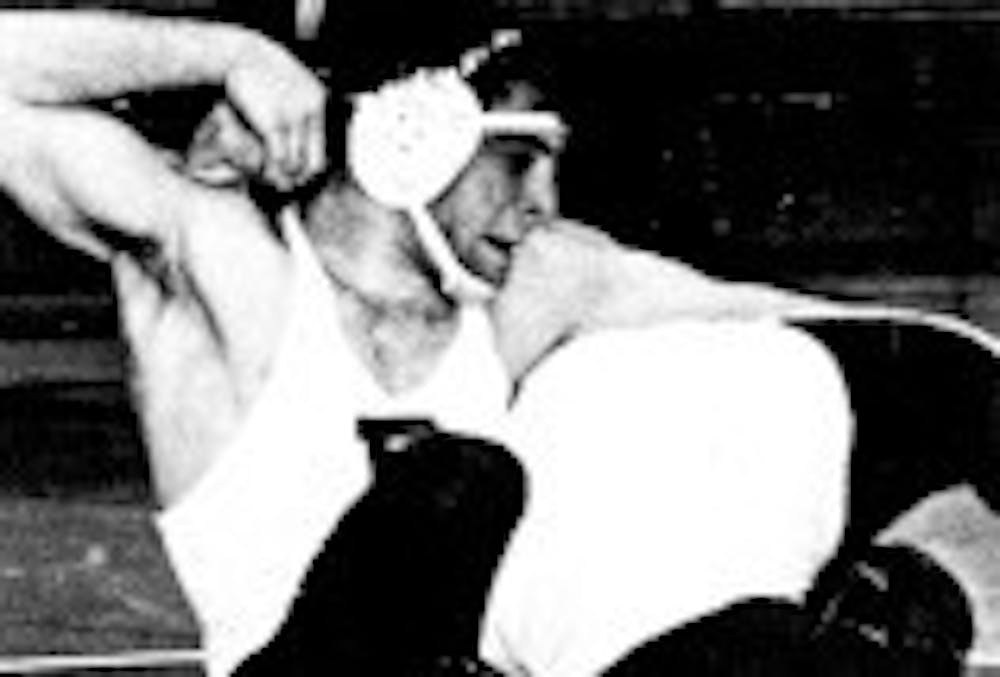Wrestling holds a very special place in the hearts of many lifelong Quakers.
Benjamin Franklin, founder of the University of Pennsylvania, wrote in his original proposal for the University, “to keep [the students] in health and to strengthen and render active their bodies they be frequently exercised in running, leaping, wrestling and swimming.” He even drew up plans to build a wrestling facility on the future campus.
Penn was the first university to recognize an undergraduate national champion in wrestling. Winchester Osgood, a football star for the Quakers, was the first collegiate athlete to win a national championship in wrestling, winning the 1893 National Amateur Middleweight Championships of America. Osgood went on to capture a three-peat, winning the title again in 1894 and 1895, placing Penn on a pedestal during the early days of the sport’s rise.
Penn also played a key role in the formation of the first-ever intercollegiate wrestling association. In 1905, head coach J. Leonard Mason, along with Charles T. Brown and J. Edgar Weisenfluh, invited all universities located on the East Coast who had a wrestling program to compete in an intercollegiate league. Penn, alongside Yale, Princeton, and Columbia, became the founding members of the Eastern Intercollegiate Wrestling Association.
In addition to both recognizing the first-ever collegiate wrestling champion and helping form the first-ever intercollegiate wrestling association, Penn also hosted the first-ever collegiate tournament for wrestling in 1905. On April 7 of that year, the first-ever intercollegiate championship for wrestling was held in Weightman Hall Gym, on Penn’s campus.
In the years following the establishment of the EIWA, the popularity of wrestling at Penn rose, and the Quakers began to build one of the premier collegiate wrestling programs in the country. Some of the most dominant wrestlers of the early 20th century donned the Red and Blue during their college years.
Mike Dorizas, who competed during the early 1910s, was well-known for pinning his opponents down in an average time of under a minute, including a masterful pinning of Jewett of Princeton in 20 seconds to win the EIWA championship. Sam Gerson won the 120-pound EIWA title and went on to win a silver medal in the 1920 Olympic Games in Antwerp, Belgium.
Penn was also responsible for the organization of the first-ever intercollegiate booster club for wrestling, founded in 1937. The “Grapplers Club” was formed under head coach W. Austin Bishop, to "promote the sport of intercollegiate wrestling at Pennsylvania and encourage good fellowship of those interested therein."
Penn’s wrestling program also served as the jumping-off point for many other famous wrestlers throughout the 20th century. In 1939, Bob Allman, a blind man, reached the EIWA finals for the third consecutive year. In 1941, National Wrestling Hall of Famer Richard DiBatista won an EIWA title and his second national championship and capped off his collegiate career with a perfect 85-0 record.
In the 1960s, Dave Pottruck placed in his weight class at the EIWA championship three of his four years. Pottruck later became an assistant coach under National Champion and Olympian Larry Lauchle in the 1970s and is also the namesake for Penn’s Pottruck Health and Fitness Center.
Despite all its success, Penn’s wrestling program was nearly canceled in 1979, after the discontinuations of men’s ice hockey and golf. Athletic Director Charles Harris informed Lauchle and the team members that the program would be phased out in the next four years. However, over the next four years, Lauchle, team members, alumni, and boosters fought hard to keep wrestling a varsity sport. The alumni and community support, along with the nostalgic memories of wrestling’s origins at Penn, revitalized the program, and wrestling remained a varsity sport.
Wrestling will surely continue to have a special place in the hearts of all Quakers past, present, or future, both for pioneering Penn's experiment with intercollegiate wrestling and for the program's continued success.









